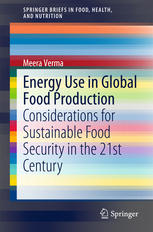

Most ebook files are in PDF format, so you can easily read them using various software such as Foxit Reader or directly on the Google Chrome browser.
Some ebook files are released by publishers in other formats such as .awz, .mobi, .epub, .fb2, etc. You may need to install specific software to read these formats on mobile/PC, such as Calibre.
Please read the tutorial at this link: https://ebookbell.com/faq
We offer FREE conversion to the popular formats you request; however, this may take some time. Therefore, right after payment, please email us, and we will try to provide the service as quickly as possible.
For some exceptional file formats or broken links (if any), please refrain from opening any disputes. Instead, email us first, and we will try to assist within a maximum of 6 hours.
EbookBell Team

4.1
60 reviewsThis Brief examines the sustainability of energy use in global food production and processing. The nexus between food, water, and energy are explored against a background of climate change. Current efforts to reduce the energy intensity of food and increase sustainability are explored. Food waste and its impact on energy is covered, including regional variations and nutrient recycling methods. Energy Use in Global Food Production uses case studies to illustrate how food production and processing is a significant contributor to anthropogenic climate change. Modern industrial agriculture uses fossil fuel to grow crops and produce fertilizers, pesticides and farm machinery. Additional energy is used to transport and process food at a primary and secondary level. With the median forecast for global population at more than 9 billion by 2030, a 30% increase over the current population, energy efficient food processing will be of increasing importance. This Brief provides an overview of current energy efficient food processing methods looks at the way forward as demands continue to increase.